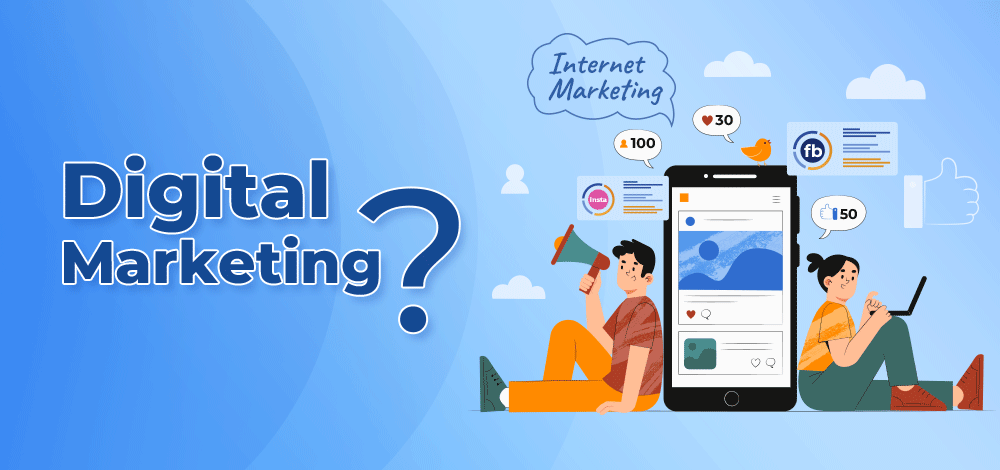Internet marketing is the practice of promoting products or services online using various digital strategies. It includes tactics such as search engine optimization (SEO), social media marketing, email marketing, and content marketing to reach a targeted audience and drive conversions.
With the rise of the internet, businesses have increasingly shifted their focus to online marketing to reach wider audiences, increase brand visibility, and generate higher revenue. The effectiveness of internet marketing lies in its ability to target specific demographics, analyze campaign performance, and optimize strategies to achieve the best results.
By leveraging the power of the internet, businesses can effectively market their products or services and achieve their marketing goals.
Overview Of Internet Marketing
Welcome to our blog post on Internet Marketing! In today’s digital age, where the internet has become an integral part of our lives, businesses must adapt and evolve their marketing strategies to capture the attention of their target audience. Internet Marketing, also known as online marketing or digital marketing, encompasses a wide range of activities aimed at promoting products or services using various online platforms and channels. In this article, we will explore the fundamentals of Internet Marketing, including what it is, its benefits, and why it is crucial for businesses in the modern world.
What Is Internet Marketing?
Internet Marketing refers to the tactics and strategies employed by businesses to promote their products or services through the internet. It involves using various online marketing channels such as search engines, social media platforms, email marketing, content marketing, and more to reach and engage with the target audience. Unlike traditional marketing methods, Internet Marketing allows businesses to target specific demographics, track the effectiveness of their campaigns, and optimize their marketing efforts in real-time. By leveraging the power of the internet, businesses can expand their reach, increase brand visibility, and drive more qualified traffic to their websites.
Benefits Of Internet Marketing
Internet Marketing offers a myriad of benefits that traditional marketing methods simply cannot match. Let’s take a look at some of the key advantages:
- Global Reach: With Internet Marketing, businesses can reach a global audience, breaking down geographical barriers and expanding their customer base.
- Cost-Effective: Online marketing methods such as social media advertising and email marketing are often more cost-effective than traditional advertising methods like TV or print ads.
- Targeted Advertising: Internet Marketing allows businesses to target their ideal customers based on demographics, interests, and browsing behavior, ensuring their ads are shown to the right people at the right time.
- Measurable Results: Unlike traditional marketing, Internet Marketing provides businesses with detailed analytics and metrics, allowing them to measure the success of their campaigns, identify areas for improvement, and make data-driven decisions.
- Increased Brand Awareness: With the internet being an integral part of people’s lives, Internet Marketing offers businesses the opportunity to create strong brand awareness through consistent online presence and engaging content.
In conclusion, Internet Marketing is a powerful tool that businesses must employ to stay competitive in today’s digital landscape. By leveraging online platforms and channels, businesses can reach a wider audience, build brand awareness, and achieve their marketing objectives in a cost-effective manner. In the next section, we will delve deeper into the various internet marketing strategies and how they can be effectively implemented to drive results. Stay tuned!

Credit: www.geeksforgeeks.org
Components Of Internet Marketing
Internet marketing utilizes various components to achieve the goal of promoting products or services online. These components work together to optimize online visibility, increase brand awareness, and drive targeted traffic to websites. In this post, we will delve into the key components of internet marketing that are essential for any business looking to succeed in the digital landscape.
Search Engine Optimization, commonly known as SEO, is the practice of optimizing a website to improve its visibility on search engine result pages. By strategically using relevant keywords, creating high-quality content, and optimizing website structure, businesses can increase organic traffic and rank higher in search engine results. An effective SEO strategy involves on-page and off-page optimization techniques to attract more visitors and improve website performance.
Social Media Marketing involves leveraging various social media platforms to promote products, engage with customers, and build brand awareness. Companies can reach a vast audience by creating compelling content and utilizing features such as ads, stories, and live videos. Social media marketing helps cultivate a loyal customer base, connect with potential customers, and foster meaningful relationships.
Email Marketing is a powerful tool for businesses to directly reach their target audience. By building a responsive email list and crafting personalized and engaging emails, businesses can nurture leads, promote products, and drive conversions. Effective email marketing campaigns involve segmentation, automation, and appealing visuals to optimize engagement and encourage customer loyalty.
Content Marketing
Content Marketing focuses on creating valuable, informative, and engaging content to attract and retain a target audience. This includes blog posts, articles, videos, infographics, and more. By providing valuable content, businesses can establish themselves as industry experts, build trust with their audience, and increase brand visibility. Content marketing is crucial for capturing organic traffic and generating leads through valuable and shareable content.
Pay Per Click (ppc) Advertising
Pay Per Click Advertising is a paid advertising model where businesses pay for each click on their ads. This form of online advertising, commonly used in search engines and social media platforms, allows companies to reach their target audience quickly. With precise targeting options, businesses can effectively optimize their PPC campaigns to achieve the desired results, whether it’s generating leads, driving traffic, or increasing sales.
Affiliate Marketing
Affiliate Marketing is a performance-based marketing strategy where businesses collaborate with affiliates or publishers to promote their products or services. Affiliates earn a commission for each successful referral or sale. This win-win partnership benefits both the business and the affiliate, as it allows the business to expand its reach and the affiliate to generate passive income. It is crucial to choose the right affiliates and establish clear terms to ensure the success of an affiliate marketing program.
Creating An Effective Internet Marketing Strategy
Internet marketing has become an essential component for businesses looking to succeed in the digital landscape. With the ever-increasing number of online users, creating an effective internet marketing strategy is crucial for reaching and engaging with your target audience. In this blog post, we will explore the key elements of an effective internet marketing strategy, including defining goals and target audience, website design and optimization, content creation and distribution, and using analytics for data-driven decision making.
Defining Goals And Target Audience
Before diving into any marketing campaign, it is essential to clearly define your goals and identify your target audience. Defining goals provides a clear direction and enables you to measure the success of your internet marketing efforts. Your target audience represents the specific group of people you want to reach with your marketing messages. By understanding their needs and behaviors, you can tailor your strategies to effectively capture their attention and drive conversions.
Website Design And Optimization
Your website serves as the central hub for your internet marketing activities. A well-designed and optimized website is crucial for attracting and retaining visitors. When designing your website, keep in mind factors such as user experience, visual appeal, and mobile responsiveness. Optimizing your website entails using keywords strategically, optimizing page load times, and ensuring easy navigation. A website that offers a seamless browsing experience will not only enhance user satisfaction but also improve your search engine rankings.
Content Creation And Distribution
Content lies at the heart of every successful internet marketing strategy. Creating high-quality and engaging content helps establish your brand as an authority and builds trust with your target audience. Consider the needs and preferences of your audience when developing content ideas. Whether it’s blog posts, videos, or infographics, create content that is valuable, informative, and shareable. Distributing your content across various platforms, such as social media, email newsletters, and guest blogging, expands your reach and maximizes its impact.
Using Analytics For Data-driven Decision Making
Analytics plays a crucial role in shaping your internet marketing strategy. By tracking and analyzing data, you gain valuable insights into your website’s performance, audience engagement, and conversion rates. Tools like Google Analytics provide an array of metrics to help you make data-driven decisions. Analyze which marketing channels are generating the most traffic and conversions, identify areas for improvement, and monitor the effectiveness of different campaigns. This data-driven approach ensures that you continually optimize your strategy, resulting in better results and a higher return on investment.
:max_bytes(150000):strip_icc()/Term-Definitions_Digital-Marketing-5ae6ea1aee934b02a94a1a4d9401443d.jpg)
Credit: www.investopedia.com
Search Engine Optimization (seo)
In today’s digital landscape, having a strong online presence is crucial for any business or website. Search Engine Optimization (SEO) plays a pivotal role in achieving this by driving organic traffic to your site and improving its visibility on search engine result pages. By optimizing your website according to search engine algorithms, you can rank higher, increase your website’s visibility, and attract more organic traffic. Let’s take a closer look at the various aspects of SEO and how they contribute to your online success.
Understanding Seo And Its Importance
SEO involves a set of techniques and strategies that aim to improve your website’s visibility on search engine result pages. When your website ranks higher in search engine results, it becomes more likely to receive organic click-throughs and attract potential customers. SEO is not a one-time effort but an ongoing process that requires time, effort, and expertise.
Keyword Research And Analysis
Keyword research is the foundation of successful SEO. It involves identifying the keywords or phrases that users are likely to search for when looking for information related to your business or website. By incorporating these keywords strategically into your website’s content, title tags, meta descriptions, and URLs, you can improve your chances of ranking higher in search results for relevant queries.
On-page Optimization Techniques
On-page optimization refers to the practices you can implement directly on your website to improve its visibility in search engine results. This includes optimizing your page titles, meta tags, headings, and URL structures. Creating high-quality, informative, and relevant content that is optimized for your target keywords is also a crucial aspect of on-page optimization.
Off-page Optimization Techniques
Off-page optimization focuses on improving your website’s visibility and authority outside of your own website. This includes building high-quality backlinks from reputable and relevant websites, engaging in social media marketing, and participating in online communities and forums. Off-page optimization techniques help search engines recognize the credibility and relevance of your website, which can positively impact your search engine rankings.
Technical Seo
Technical SEO involves optimizing the technical aspects of your website to improve its search engine visibility. This includes ensuring that search engine crawlers can easily navigate and understand your website’s structure and content. Technical SEO involves optimizing website speed, implementing schema markup, improving site architecture and XML sitemaps, and addressing any crawling and indexing issues that may hinder search engine visibility.
In conclusion, SEO is an integral part of any successful internet marketing strategy. By understanding and implementing the various aspects of SEO, such as keyword research, on-page and off-page optimization techniques, and technical SEO, you can improve your website’s visibility, drive organic traffic, and ultimately, achieve your online goals.
Social Media Marketing
Social media has revolutionized the way businesses market their products and services. With the ever-increasing number of active users on various social media platforms, leveraging social media marketing has become essential for any business looking to grow and succeed in the digital world. In this blog post, we will explore the role of social media in marketing, how to choose the right platforms, create engaging content, build and engage with social media communities, and measure and analyze social media metrics.
The Role Of Social Media In Marketing
Social media plays a crucial role in modern marketing strategies. It allows businesses to connect with their target audience on a personal level, build brand awareness, and drive traffic to their website or online store. With social media, companies can directly engage with their customers by responding to inquiries, addressing concerns, and showcasing their expertise. Furthermore, social media platforms provide businesses with valuable insights into their customers’ preferences, behaviors, and interests, allowing for more targeted and effective marketing efforts.
Choosing The Right Social Media Platforms
When it comes to social media marketing, not all platforms are created equal. It is important for businesses to carefully choose the platforms that align with their target audience and marketing goals. Each social media platform has its unique demographic, user behavior, and content format. For example:
| Social Media Platform | Main Demographic | Content Format |
|---|---|---|
| Wide-ranging demographics | Text, images, videos | |
| Youthful demographics | Images, videos | |
| Professionals and businesses | Text, articles, professional networking |
By understanding the characteristics of each platform, businesses can make informed decisions about where to invest their time and resources for maximum impact.
Creating Engaging Social Media Content
In order to stand out on social media, businesses need to create content that is not only visually appealing but also relevant and engaging to their target audience. Some key tips for creating engaging social media content include:
- Researching and understanding your target audience’s interests and preferences
- Using eye-catching visuals such as high-quality images and videos
- Writing compelling captions that grab attention and encourage interaction
- Experimenting with different content formats, such as infographics, polls, and live videos
- Posting consistently and at times when your audience is most active
Building And Engaging With A Social Media Community
A social media community consists of your followers and fans who actively engage with your content and share it with others. Building a strong community on social media can have a significant impact on your brand’s visibility and credibility. To build and engage with a social media community, consider implementing these strategies:
- Respond promptly and authentically to comments and messages
- Encourage user-generated content by running contests or asking for feedback
- Collaborate with influencers or brand advocates to expand your reach
- Participate in relevant conversations and use hashtags to join industry-related discussions
Measuring And Analyzing Social Media Metrics
In order to track the effectiveness of your social media marketing efforts, it is crucial to measure and analyze relevant metrics. Some key social media metrics to consider include:
- Reach: How many people have seen your content
- Engagement: How many likes, comments, shares, and clicks your content receives
- Conversion: How many social media followers have taken a desired action, such as purchasing a product or signing up for a newsletter
- Referral traffic: How much traffic your website or landing page receives from social media platforms
By regularly analyzing these metrics, you can gain valuable insights into what is working and what needs improvement, allowing you to optimize your social media marketing strategy for better results.
Email Marketing
Email marketing is a powerful tool that allows businesses to connect with their audience and drive engagement. By utilizing effective email campaigns, businesses can build a loyal customer base, increase brand awareness, and drive sales. In this blog post, we will explore the key aspects of email marketing that can help you achieve your marketing goals.
Building An Email List
Building an email list is the first step in successful email marketing. An email list is a collection of email addresses that have been voluntarily provided by your target audience. To start building your email list, consider the following strategies:
- Create compelling lead magnets that provide value to your audience in exchange for their email addresses. These could include e-books, guides, templates, or exclusive discounts.
- Add opt-in forms on your website or landing pages to capture visitor’s email addresses. Place them strategically to maximize visibility and conversions.
- Promote your email newsletter or updates on your social media platforms to encourage your followers to opt-in.
Designing Effective Email Campaigns
An effective email campaign design is crucial for capturing the attention of your subscribers and driving conversions. Consider the following tips when designing your email campaigns:
- Use eye-catching subject lines that entice recipients to open your emails. Personalize subject lines whenever possible to increase open rates.
- Keep your email templates clean and uncluttered, making it easy for recipients to read and navigate through your email content.
- Incorporate compelling and visually appealing images that support your email message and capture the reader’s attention.
- Add a clear call-to-action (CTA) that stands out and encourages recipients to take the desired action, whether it’s making a purchase or visiting your website.
Segmenting And Personalizing Emails
Segmenting your email list and personalizing your emails can significantly improve engagement and conversion rates. By sending targeted, personalized content to specific segments of your audience, you can cater to their specific needs and interests. Consider the following segmentation and personalization strategies:
- Segment your email list based on demographics, interests, purchase history, or engagement level. This allows you to send tailored content to each segment, increasing relevancy.
- Personalize your emails by using the recipient’s name and addressing their specific pain points or interests. This creates a sense of connection and increases the chances of conversion.
- Utilize dynamic content in your emails to show different content blocks based on the recipient’s preferences or previous interactions with your brand.
Improving Email Deliverability
Email deliverability refers to the ability of your emails to reach the recipient’s inbox successfully. To improve your email deliverability, consider implementing the following practices:
- Ensure your email list is clean and up-to-date by regularly removing invalid or inactive email addresses.
- Authenticate your domain and set up proper email authentication protocols, such as DKIM and SPF, to verify the legitimacy of your emails.
- Avoid using spam trigger words or phrases in your subject lines or email content to prevent your emails from being flagged as spam.
- Regularly monitor your email deliverability metrics and use an email service provider with a good reputation to ensure your emails are being delivered effectively.
Analyzing Email Marketing Performance
Analyzing the performance of your email marketing campaigns is essential for identifying areas of improvement and making data-driven decisions. Consider the following metrics and strategies to analyze your email marketing performance:
- Track open rates, click-through rates, and conversion rates to gauge the effectiveness of your email campaigns.
- A/B test different elements of your emails, such as subject lines, CTAs, and design, to identify what resonates best with your audience.
- Monitor subscriber engagement metrics, such as unsubscribes and spam complaints, to understand how well your email content is received.
- Use email analytics tools to gain insights into your audience’s behavior, preferences, and engagement patterns, allowing you to optimize your future email campaigns.
Measuring And Optimizing Internet Marketing Campaigns
When it comes to internet marketing, one of the most crucial aspects is measuring and optimizing your campaigns to ensure maximum success. By consistently monitoring your key performance indicators (KPIs), using analytics tools, optimizing conversion rates, conducting A/B testing, and identifying and fixing performance issues, you can ensure that your internet marketing efforts are delivering the desired results. In this section, we will explore each of these strategies in detail to help you achieve optimal performance with your internet marketing campaigns.
Setting Key Performance Indicators (kpis)
Setting clear and measurable goals is essential for any successful internet marketing campaign. Before launching your campaign, you need to define your key performance indicators (KPIs) to track and assess its performance effectively. KPIs can include metrics such as website traffic, conversion rates, click-through rates, and engagement levels. By setting specific KPIs, you can evaluate your campaign’s success and make data-driven decisions to optimize your marketing efforts further.
Using Analytics Tools
Analytics tools play a vital role in measuring the effectiveness of your internet marketing campaigns. By leveraging platforms such as Google Analytics or Adobe Analytics, you can gain valuable insights into various performance metrics. These tools allow you to track website traffic, visitor demographics, user behavior, and other valuable data points. With this information, you can assess the effectiveness of your marketing strategies and make data-driven decisions to optimize your campaigns.
Conversion Rate Optimization
A crucial aspect of internet marketing is optimizing your conversion rates. Conversion rate optimization involves improving the percentage of website visitors who take the desired action, such as making a purchase or filling out a form. By analyzing user behavior, conducting A/B testing, and making data-driven changes to your website or landing pages, you can maximize your conversion rates. Through continuous optimization, you can improve your return on investment (ROI) and ultimately achieve your marketing goals.
A/b Testing
A/B testing is a powerful strategy that allows you to test and compare different versions of your marketing campaigns to determine which one performs better. By creating two or more variations of your ads, landing pages, or emails and showing them to different segments of your audience, you can identify the most effective elements. This data-driven approach enables you to optimize your campaigns based on real-time results, ensuring you consistently deliver the most impactful messages to your target audience.
Identifying And Fixing Performance Issues
Identifying and fixing performance issues is crucial for maintaining the effectiveness of your internet marketing campaigns. By regularly monitoring your campaigns and analyzing performance data, you can quickly identify any underperforming areas. Whether it’s a high bounce rate, low click-through rate, or low conversion rate, addressing these issues promptly is key to maximizing your marketing efforts. By fixing performance issues, you can enhance the user experience, attract more qualified leads, and ultimately increase your chances of success in the competitive online landscape.

Credit: www.simplilearn.com
Frequently Asked Questions On Internet Marketing
What Is Internet Marketing?
Internet marketing refers to the strategies and techniques used to promote products or services online. It includes various digital channels such as social media, search engines, email, and website advertising. Internet marketing helps businesses reach a wider audience, increase brand visibility, and drive more traffic to their websites.
Why Is Internet Marketing Important?
Internet marketing is important because it allows businesses to connect with their target audience in a more personalized and cost-effective way. It enables companies to reach a global market, engage with customers in real-time, and track the effectiveness of their campaigns.
Internet marketing also helps businesses build brand authority and increase their online presence.
How Can Internet Marketing Benefit My Business?
Internet marketing can benefit your business in numerous ways. It can help increase brand awareness, generate leads, drive website traffic, boost sales, and improve customer engagement. With internet marketing, you can target specific demographics, measure the success of your campaigns, and make data-driven decisions to optimize your marketing strategies.
What Are The Key Components Of Internet Marketing?
The key components of internet marketing include search engine optimization (SEO), pay-per-click (PPC) advertising, social media marketing, email marketing, content marketing, and conversion rate optimization (CRO). These components work together to create a comprehensive digital marketing strategy that drives traffic, engages customers, and increases conversions.
Conclusion
Internet marketing has become an essential tool for businesses to reach their target audience and promote their products or services effectively. With the right strategies and techniques, businesses can increase their online visibility, generate more leads, and ultimately boost sales.
It is crucial for companies to stay updated with the latest trends and adapt to the ever-changing digital landscape to stay ahead of the competition. By investing in internet marketing, businesses can establish a strong online presence and achieve long-term success.




